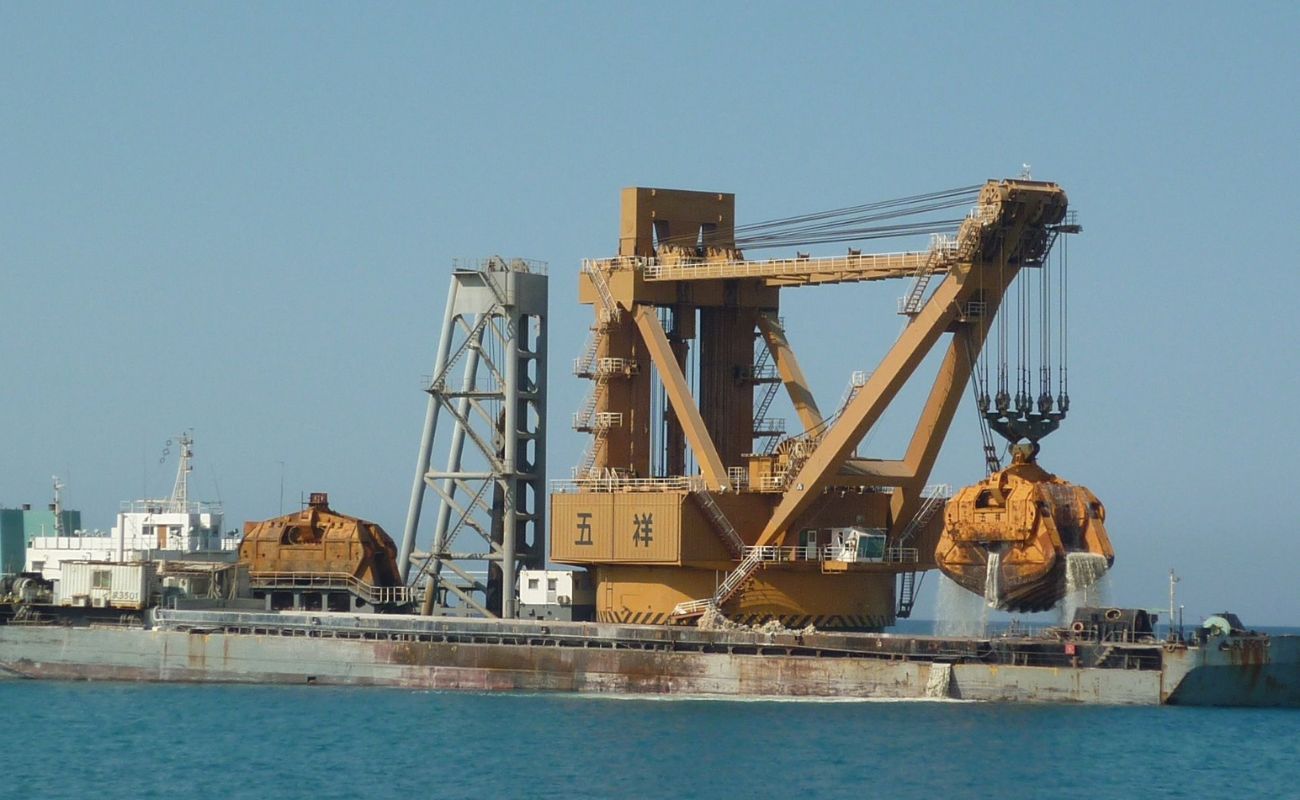Home>diy>Planning & Engineering>Which Specialization In Civil Engineering Is The Best


Planning & Engineering
Which Specialization In Civil Engineering Is The Best
Modified: January 4, 2024
Discover the best specialization in civil engineering, with a focus on planning engineering, to propel your career to new heights in the construction industry.
(Many of the links in this article redirect to a specific reviewed product. Your purchase of these products through affiliate links helps to generate commission for Storables.com, at no extra cost. Learn more)
Introduction
Civil engineering is a diverse field that offers various specializations to suit different interests and career goals. As a civil engineer, choosing the right specialization can open up exciting opportunities to work on a wide range of projects and make a significant impact on society.
Each specialization within civil engineering focuses on a specific aspect of infrastructure development and requires a unique set of skills and expertise. In this article, we will explore some of the best specializations in civil engineering and highlight the key aspects, job prospects, and why they are considered top choices.
Whether you are a student considering which area to specialize in or a professional looking to switch your focus, it’s important to carefully consider your interests, strengths, and long-term goals to make an informed decision.
Before we delve into the specific specializations, it’s worth mentioning that civil engineering as a whole plays a vital role in designing, constructing, and maintaining the infrastructure that we rely on every day. From bridges and buildings to roads and water treatment plants, civil engineers ensure the safety, functionality, and sustainability of these structures.
Now, let’s explore some of the best specializations in civil engineering and what makes them stand out.
Key Takeaways:
- Structural engineering offers exciting opportunities to design iconic structures, collaborate with multidisciplinary teams, and contribute to safe and sustainable infrastructure in high demand worldwide.
- Geotechnical engineering provides rewarding career prospects, challenging projects, and the opportunity to ensure the stability and safety of infrastructure in a growing and developing world.
Structural Engineering Specialization
Structural engineering is one of the most popular and widely recognized specializations in civil engineering. It focuses on the design, analysis, and construction of various structures, such as buildings, bridges, and dams. Structural engineers ensure that these structures can withstand the forces and loads they are subjected to, while also considering factors like durability, safety, and aesthetics.
This specialization requires a solid understanding of structural mechanics, materials science, and computer-aided design (CAD) software. Structural engineers work closely with architects and construction teams to develop efficient and safe designs that meet building codes and regulations.
One of the reasons why structural engineering is considered a top specialization is the high demand for structural engineers in the construction industry. With the increasing need for infrastructure development worldwide, there is a constant need for professionals who can design and analyze complex structures.
Structural engineers often find employment in engineering consulting firms, architectural companies, government agencies, and construction companies. They are involved in projects ranging from residential and commercial buildings to large-scale infrastructure projects like bridges and stadiums.
Additionally, advancements in technology and the use of computer simulations have revolutionized the field of structural engineering. Engineers now use sophisticated software to model and analyze structures, making the design process more efficient and accurate.
Overall, a specialization in structural engineering offers an exciting career with opportunities to work on iconic projects, collaborate with multidisciplinary teams, and contribute to the development of safe and sustainable infrastructure.
Geotechnical Engineering Specialization
Geotechnical engineering is a specialization within civil engineering that focuses on the behavior of soil and rocks and their interaction with structures. Geotechnical engineers play a crucial role in assessing the stability and suitability of the ground for construction purposes, as well as mitigating risks associated with soil and rock mechanics.
Geotechnical engineers are involved in analyzing soil and rocks to determine their engineering properties, such as strength, compressibility, and permeability. They use this information to design foundations for buildings, bridges, and other infrastructure projects. They also evaluate slopes, embankments, and retaining walls to ensure their stability and prevent hazardous situations.
This specialization requires a solid understanding of geology, soil mechanics, and foundation engineering principles. Geotechnical engineers often work on site investigations, conducting tests and collecting samples to gather data for their analysis. They use various tools and techniques, such as ground-penetrating radar and borehole testing, to assess the subsurface conditions and make informed decisions.
One of the reasons why geotechnical engineering is considered a top specialization is the increasing recognition of the importance of proper soil analysis in construction projects. With the rising demand for urban development and infrastructure, geotechnical engineers are in high demand to ensure the safety and stability of structures.
Geotechnical engineers find employment in consulting firms, geotechnical engineering laboratories, government agencies, and construction companies. They work closely with other professionals, including structural engineers and architects, to develop optimal design solutions that consider the characteristics of the soil and rocks.
Advancements in technology have also impacted the field of geotechnical engineering. Engineers now use computer models and geotechnical software to simulate the behavior of soil and rocks, allowing for more accurate and efficient design and analysis processes.
In summary, a specialization in geotechnical engineering offers a rewarding career with opportunities to work on challenging projects, conduct field investigations, and ensure the stability and safety of infrastructure in a world that continues to grow and develop.
Environmental Engineering Specialization
Environmental engineering is a specialization within civil engineering that focuses on the protection and improvement of the environment. It involves the application of engineering principles to address environmental challenges, such as pollution control, waste management, and sustainable development.
Environmental engineers play a crucial role in developing solutions to mitigate the negative impacts of human activities on the environment. They work on projects that involve improving water and air quality, managing hazardous waste, designing wastewater treatment plants, and implementing sustainable practices.
This specialization requires a strong understanding of environmental science, chemistry, biology, and engineering principles. Environmental engineers often conduct environmental impact assessments, monitor pollution levels, and design systems to treat and manage various types of waste.
One of the reasons why environmental engineering is considered a top specialization is the increasing awareness and importance placed on sustainable development. As society continues to grapple with environmental issues like climate change and pollution, there is a growing demand for professionals who can develop innovative solutions to protect the environment.
Environmental engineers find employment in consulting firms, government agencies, research institutions, and environmental organizations. They collaborate with scientists, policymakers, and community stakeholders to develop and implement strategies that promote environmental sustainability.
Advancements in technology have also had a significant impact on the field of environmental engineering. Engineers now use advanced modeling and simulation tools to assess the environmental impact of projects, optimize resource management, and develop sustainable designs.
In summary, a specialization in environmental engineering offers a rewarding career with opportunities to make a positive impact on the environment. Environmental engineers play a vital role in creating a sustainable future, addressing environmental challenges, and ensuring the well-being of both present and future generations.
Consider your interests and career goals when choosing a specialization in civil engineering. Transportation, structural, geotechnical, environmental, and water resources are all valuable options, so choose the one that aligns with your passion and strengths.
Transportation Engineering Specialization
Transportation engineering is a specialized field within civil engineering that focuses on the planning, design, and operation of transportation systems. It involves the development of safe, efficient, and sustainable infrastructure to facilitate the movement of goods and people.
Transportation engineers are responsible for designing and optimizing the layout of road networks, intersections, and transportation terminals. They analyze traffic patterns, assess the impacts of proposed transportation projects, and develop strategies to improve traffic flow and reduce congestion.
This specialization requires a comprehensive understanding of transportation planning, traffic engineering, and roadway design principles. Transportation engineers use computer models and simulations to evaluate the performance of transportation systems and propose improvements.
One of the reasons why transportation engineering is considered a top specialization is the critical role it plays in improving mobility and connectivity. As urban populations continue to grow, efficient transportation systems are essential for economic development, social connectivity, and reducing environmental impacts.
Transportation engineers find employment in consulting firms, government transportation departments, research institutions, and transit agencies. They work on a variety of projects, including urban road networks, public transit systems, airports, and railways.
Advancements in technology have significantly influenced the field of transportation engineering. Engineers now use intelligent transportation systems and real-time traffic management tools to optimize traffic signal timings, monitor traffic conditions, and improve safety on the roads.
In summary, a specialization in transportation engineering offers a dynamic and challenging career with opportunities to shape the way people and goods move. Transportation engineers play a crucial role in improving the efficiency and sustainability of transportation systems, enhancing quality of life, and promoting economic growth.
Construction Engineering Specialization
Construction engineering is a specialization within civil engineering that focuses on the management and execution of construction projects. Construction engineers play a critical role in overseeing the planning, design, and construction processes to ensure projects are completed on time, within budget, and according to specifications.
Construction engineers are involved in various aspects of a project, including estimating costs, scheduling, procurement of materials, and coordination of resources. They collaborate with architects, contractors, and subcontractors to ensure efficient project execution and adherence to quality standards and safety regulations.
This specialization requires a comprehensive understanding of construction management principles, construction techniques, and project planning. Construction engineers need strong leadership and communication skills, as they often work in diverse teams and interact with stakeholders throughout the project lifecycle.
One of the reasons why construction engineering is considered a top specialization is the high demand for professionals who can effectively manage complex construction projects. The construction industry is constantly evolving, and there is a growing need for construction engineers who can navigate challenges, optimize construction processes, and deliver successful projects.
Construction engineers find employment in construction companies, project management firms, engineering consulting companies, and government agencies. They work on a wide range of projects, including residential and commercial buildings, infrastructure projects, and industrial facilities.
Advancements in technology have significantly impacted the field of construction engineering. Engineers now use Building Information Modeling (BIM) software, drones for site inspections, and project management software to streamline construction processes, improve communication, and enhance project efficiency.
In summary, a specialization in construction engineering offers a rewarding and dynamic career with opportunities to oversee and manage diverse construction projects. Construction engineers play a crucial role in ensuring the successful execution of projects, from planning to completion, and contribute to the growth and development of the built environment.
Water Resources Engineering Specialization
Water resources engineering is a specialization within civil engineering that focuses on the management, development, and protection of water resources. Water resources engineers play a crucial role in assessing water availability, designing water supply and distribution systems, managing flood control measures, and addressing environmental issues related to water resources.
This specialization requires a comprehensive understanding of hydrology, hydraulics, water treatment processes, and environmental regulations. Water resources engineers work on projects that involve the design and operation of dams, reservoirs, water treatment plants, irrigation systems, and stormwater management systems.
One of the reasons why water resources engineering is considered a top specialization is the increasing focus on sustainable management of water resources and the growing need for professionals who can address water scarcity and quality issues. With population growth, urbanization, and climate change, the effective management of water resources has become critical for ensuring a reliable water supply and protecting ecosystems.
Water resources engineers find employment in consulting firms, government agencies, research institutions, and environmental organizations. They work on a wide range of projects, including water supply systems, wastewater treatment plants, hydroelectric power generation, and watershed management.
Advancements in technology have significantly influenced the field of water resources engineering. Engineers now use computer models and remote sensing techniques to assess water availability, simulate hydrological processes, and develop effective water management strategies.
In summary, a specialization in water resources engineering offers a challenging and fulfilling career with opportunities to contribute to the sustainable management of one of our most valuable resources. Water resources engineers play a crucial role in ensuring the availability and quality of water for communities, industries, and the environment.
Conclusion
Civil engineering offers a wide range of specializations, each with its own unique focus and opportunities. From structural engineering to environmental engineering, transportation engineering to construction engineering, and water resources engineering to geotechnical engineering, there is a specialization to suit different interests and career aspirations.
Choosing the best specialization in civil engineering depends on individual strengths, interests, and long-term career goals. Structural engineering is a popular choice for those interested in designing and constructing safe and functional structures. Geotechnical engineering is ideal for those fascinated by soil and rock mechanics and their influence on construction projects. Environmental engineering caters to those passionate about sustainability and protecting the environment. Transportation engineering offers opportunities to improve mobility and develop efficient transportation systems. Construction engineering is ideal for those interested in project management and overseeing construction projects. Lastly, water resources engineering focuses on the management and protection of vital water resources.
It’s important to stay informed about advancements in technology and industry trends within each specialization. Technology, such as computer simulations, modeling software, and real-time monitoring systems, has revolutionized the practice of civil engineering and has the potential to significantly impact each specialization.
Regardless of the chosen specialization, civil engineers have an inherent responsibility to design and construct infrastructure that is safe, efficient, sustainable, and enhances the quality of life for individuals and communities. The demand for skilled civil engineers remains strong, with continuous opportunities in various sectors, such as consulting, construction, research, and government agencies.
In conclusion, choosing the best specialization in civil engineering involves thoughtful consideration of personal interests, strengths, and long-term goals. Each specialization provides a unique path to make valuable contributions to society and create a sustainable and resilient built environment for future generations.
Frequently Asked Questions about Which Specialization In Civil Engineering Is The Best
Was this page helpful?
At Storables.com, we guarantee accurate and reliable information. Our content, validated by Expert Board Contributors, is crafted following stringent Editorial Policies. We're committed to providing you with well-researched, expert-backed insights for all your informational needs.















0 thoughts on “Which Specialization In Civil Engineering Is The Best”